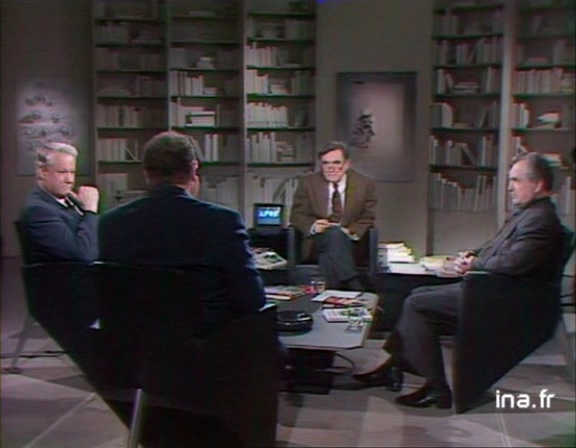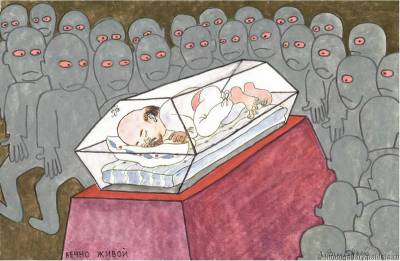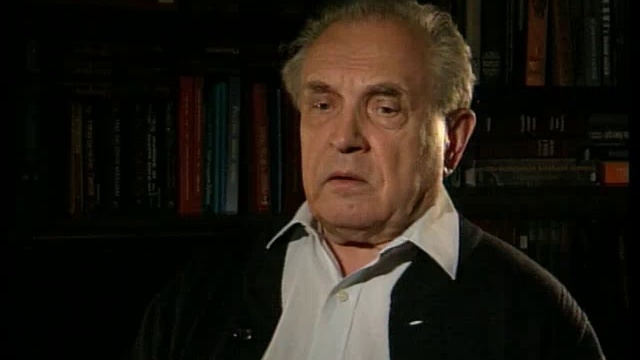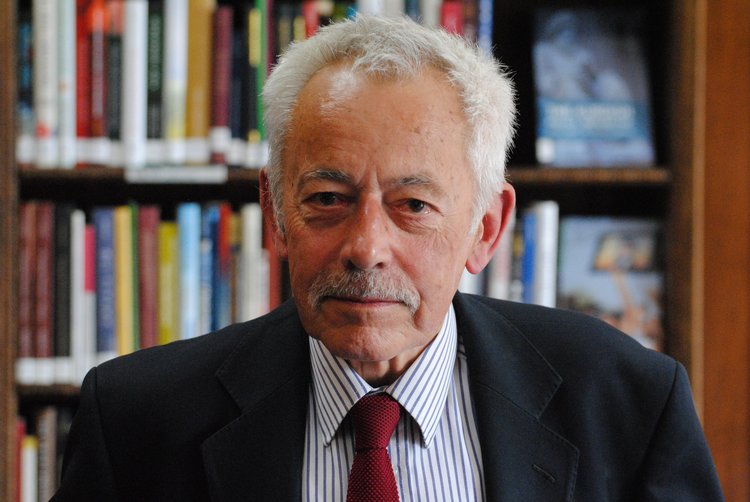
“Do you think the West wants Soviet people to live in luxury, be well fed? Not remotely! The West wants the Soviet Union to break up”
Professor emeritus, University of GlasgowMichael Kirkwood continues to present to RI readers the life and works of outstanding Russian thinker Alexander Zinoviev:
In March 1990 Zinoviev, still banned from entering the USSR, converged (or, more accurately, clashed) in a debate with a then popular opposition politician Boris Yeltsin on French TV channel Antenne 2 and told him in detail what would happen to the Motherland and to him were he to win. Yeltsin was greatly offended. It would be interesting to know whether he remembered this conversation when he became President and acted exactly according to Zinoviev’s ‘blue-print’.
As it happens, I actually watched that debate at the time. I had by then spent enough time acquainting myself with the life and works of Zinoviev up that point not to be remotely surprised that Zinoviev was uncompromising in his views in his exchanges with Mr Yeltsin. I was writing my Zinoviev monograph (Alexander Zinoviev: an Introduction to his Work) during that period.
Two chapters were entitled respectively ‘Gorbachevism” and ‘Katastroika’. When he wrote his book Gorbachevism (published in 1987), he criticised the project of ‘perestroika’ with its concomitants ‘glasnost’ and ‘uskorenie’ (acceleration), with his usual combination of satire and incision, but without any particular fear for the future of Soviet Communism (a future he had predicted in earlier work would last for thousands of years).
It was a different story in his book Katastroika (published in 1988). Here he charts the evolution of ‘Gorbachevism’ via an intermediary stage of ‘crisis’ to full-blown ‘catastrophe’. By now he is no longer so sure that the Soviet Union as such will survive. His previous attitude towards the West, a mixture of scorn for its inability to get to grips with ‘the reality of communism’ and fear for its long-term survival radically changes from 1988 onwards.
By March 1990 he has become appalled at what is happening to his country, fearful for its survival, ashamed of its leaders, and absolutely ready for a public ‘exchange of views’ with Boris Yeltsin.
Translated from Russian especially for RI by Sergei Malygin
“In politics one should strike the opponent, not the ball”
Host: – Alexander Zinoviev, I would like to know your opinion on Yeltsin.
Zinoviev: It is the first time I meet a Soviet politician of such a caliber. I met Suslov, Voroshilov, Andropov, but rather incidentally. For example, I ran into Andropov on Lubyanka. The guards let me pass, but Andropov was frightened and hid in the car. I was interrogated all night…
I sympathize with Yeltsin on a human level. But when I pick up a pen, I show no mercy to anyone. Boris Nikolayevich is present in my book Katastroika.

Host: Boris Yeltsin, you were an athlete, a volleyball champion. Maybe politics and volleyball are similar? One must jump higher and hit the ball?
Yeltsin: Not just the ball, hit the opponent. The foe. That is the difference.
“I dictated to Brezhnev”
Host: Do you owe your career to Brezhnev? Maybe he set you apart?
Yeltsin: No, at that time he was not able to recognize or choose or differentiate between good and bad.
Host: Was it as bad as that?
Yeltsin: It was a s bad as that. He was completely incapable of leading the state. When I was elected first secretary of the regional committee, I came to him with a paper to resolve an issue for the region. I dictated him a resolution. Each word I dictated he wrote down. Then I told him: now sign it – he signed. Now date it – he wrote down the date. Now call the secretary – he called her.

Host: So what does that mean? An old man like that was the leader of the Soviet Union?
Yeltsin: Our leaders die constantly. You do not speak ill of the dead. We, on the contrary, do not speak any good of them, as you will have noticed.
“Privileges have to be revoked”
Host: Why don’t you want to be member of Gorbachev’s nomenklatura, why do you reject privileges?
Yeltsin: When I became a member of the Politburo, I became convinced how immoral it is. Especially to your own people, when 48 million live below the poverty line. The royal luxury in which members of the Politburo of the Central Committee live is simply breath-taking.
Host: In the Soviet Union few leaders would decline privileges. You describe Gorbachev harshly, as a person who loves privileges, collects dachas…
Yeltsin: Well, I gave up my last pivilege just before coming here – the private government Volga. Unfortunately nobody followed my example. My family also has a hard time giving up the habit. I will probably have to take away these privileges later, with the help of the people.
Host: The more privileges you give up, the more people love you and your colleagues hate you.
Yeltsin: Yes, naturally. Especially the party and state apparatus I oppose. I am stunned that at this moment the salary of the apparat has been raised by one and a half times or doubled. This is monstrous.
Host: But this is your chance. If everyone gave up privileges, would you be less popular today?
Yeltsin: This is not about popularity. This is for me a matter of moral principle, I cannot do otherwise.
“Is it necessary to have four dachas?”
Host: So, is Boris Yeltsin right in rejecting his privileges?
Zinoviev: From a sociological point of view this is a meaningless step. Society without privileges will collapse. It is like an army with generals eating the same fare as soldiers. The presence of hierarchy and privilege is normal… Rejecting them makes a strong impression on the masses – they will all cheer. But when a politician makes such a move, it indicates a lack of understanding of the social laws by which society operates.
Right now Boris Nikolayevich is outraged that the salary of the apparat has been increased. That is because of inflation. When I was a professor I was paid 500 rubles and now professors are paid 500 rubles a month, but people in co-ops are paid 500-700 rubles a day. The rejection of privileges delights the masses. But if Boris Nikolayevich becomes the head of the state, this will be his biggest misfortune – we will see how it goes then. You can revoke the privileges, but they will be restored in other ways! People will still grab what they can in their positions.
Yeltsin: I strongly disagree. Zinoviev does not know the privileges of the highest ranks.
Zinoviev: I do.
Yeltsin: No, he does not. He does not know that Thatcher has two security guards, but if Gorbachev travels, he has 200 guards. What for? Necessity? Is it necessary to have four dachas? And to build them during the four years of perestroika? The man who is in charge of the government should be beyond reproach! But he lives in excessive luxury – this is immoral. So, if it is my fate to become leader, one of the first laws of Russia will be the elimination of these privileges.
“If you allow thousands of political parties – all of them will turn into mafias”
Host: Today your enemies are the privileges and the bureaucracy. But it turns out you are attacking the party?
Yeltsin: Yes, the party too. Because during five years of perestroika, the party has not been overhauled. Nothing in it has been rebuilt. The party was lagging behind at the beginning of perestroika, and it is still lagging behind.
Host: What is the way forward?
Yeltsin: If the party undergoes an overhaul with abandonment of the vertical structure and a transition to a horizontal structure, introduces direct elections of delegates to the congress, allows the creation of parties, separate factions and platforms, then the party will arrest the catastrophic decline of its authority among the masses.
Host: Alexander Zinoviev, your book Katastroika is a mordant satire on perestroika. But without perestroika, Yeltsin would not be able to converse with the writer, who is considered an outcast…
Zinoviev: What do you mean? I should be happy that I am able to meet Yeltsin? Well, let’s be serious. Perestroika is not progress, it is a disease infecting society. This is a crisis! The only solution is counter-perestroika. The continuation of the disease is not a way out of the disease. Why is there no perestroika in the party? Because there is no party! This is not a political party. Nothing can be rebuilt there. You can allow a thousand parties in the Soviet Union, all of them will degenerate into a political mafia! Create them and you will see what happens.
Host: When Yeltsin says that we need to speed up perestroika, do you think he wants to accelerate the disease?
Zinoviev: Yes, he wants to bring the country closer to death.
Host: Boris Yeltsin, you need to defend your perestroika, a perestroika you want to speed up…
Yeltsin: Defend it from whom? From a man who is behind the times? No, I am going to attack. We must act decisively and radically, not like Gorbachev with his half measures, compromises and indecisiveness. A radical overhaul is necessary. Without it we will continue to sink deeper into the swamp…
“Gorbachev is simply afraid of me”
Host: But I am surprised you do not have a program, for example, on the national issue. Do you think Lithuania could become independent tomorrow? You do not offer solutions, you only describe the general perspective.
Yeltsin: Well, having no knowledge of my program does not mean that it does not exist. Perhaps our media do not present it.
Host: The impression is that Gorbachev should have Yeltsin on the left who says: “Faster, faster” and Ligachev on the right who says: “No, let’s slow down…” You serve the interests of Gorbachev…
Yeltsin: Yes, that is how it was at the beginning. To look like a democrat, Gorbachev had to listen to some criticism. Then, he was a democrat. Now it is not about him needing me, he is simply afraid of me. He does not know how to get rid of me. He did everything to stop me from winning in the parliament elections. The whole apparat slandered me, slung mud at me.
“People are losing patience, people will take to the streets”
Host: How do you see the future of the Soviet Union?
Yeltsin: Gorbachev’s haste to immediately convene the congress and elect a president instead of having election by the people – this, of course, provokes protest and our group will block the elections. A number of republics, I think, will also block them. They understand that an increase of central power may lead to the suppression of their sovereignty…
And Mr. Zinoviev does not know what is going on among the people at plants and factories. People are losing their patience, they will take to the streets. The critical mass of discontent has been almost reached by now.
Host: So, people might overthrow Gorbachev and elevate you because you are very popular.
Yeltsin: No, I am not talking about myself. I say that the people will take over and put in power those who are needed today – younger, energetic, people who can save the country without exercising supreme power. Supreme power is dangerous for our country. Moreover, especially if it is in the same hands as before.
“A New Stalin will appear”
Host: Alexander Zinoviev, you accuse the Western countries of making Gorbachev a star.
Zinoviev: I want to make a brief remark about what Yeltsin said. People already took power in the Soviet Union into their own hands. And what happened? Stalin appeared. And if the people take power into their own hands, whoever it happens to be – even Yeltsin – he would still be a new Stalin. He will play the same role.
Now, why does the West applaud Gorbachev and Yeltsin? Do you think the West wants Soviet people to live in luxury, be well fed? Not remotely! The West wants the Soviet Union to break up. Gorbachev and Yeltsin get a pat on the back because the West thinks they are destroying the country. The West says: act, Misha – and he is happy to act energetically. Multiple parties, the parliament! It is all a game for the West. As soon as the West sees that Gorbachev is not destroying Soviet society and is leading it out of the crisis, Gorbachev’s fame here will end and he will be vilified. Mark my words!
“The Brezhnev era will be remembered as “the golden age”
Host: In that case, was it necessary to save the old regime, which ruled with an iron fist?
Zinoviev: I am not a politician, I am a researcher. I will tell you exactly what will happen. After five or six years something like Brezhnev times will return. Perhaps even worse, closer to the Stalin version. The Brezhnev era will be remembered as “the golden age”. That is what will happen. But if Gorbachev manages to destroy Soviet society, he will be named Man of the Century. Not Lenin, not Stalin – personalities of epoch-making scale – but the insignificant apparatchik Gorbachev.
Yeltsin: I do not want to carry the argument to such extremes as Zinoviev, but I think that after all people can have their say – and it will not necessarily lead to the emergence of a new dictator like Stalin.
Host: Would you like to replace Gorbachev and become the number one in the USSR?
Yeltsin: No.
Host: Why?
Yeltsin: Because the future belongs to Russia.
P.S. It will take a little over a year and on August, 19, 1991, the first day of the convocation of the State Committee on the State of Emergency, Alexander Zinoviev will send to the Kremlin a telegram from Munich: “ISOLATE YELTSIN IMMEDIATELY”. He won’t be isolated, the coup will fail. And four months later, Boris Yeltsin will sign the Belavezha Accords on behalf of Russia burying the USSR. The population’s wealth will fall by half. The privileges of members of the Politburo will look ridiculous compared to the wealth of the new elite – the oligarchs and the bureaucracy. In the fall of 1993 the Russian parliament will be shot at from tanks. The president will receive more power than Stalin had. In opinion polls, Russians will call the Brezhnev times the best times…



